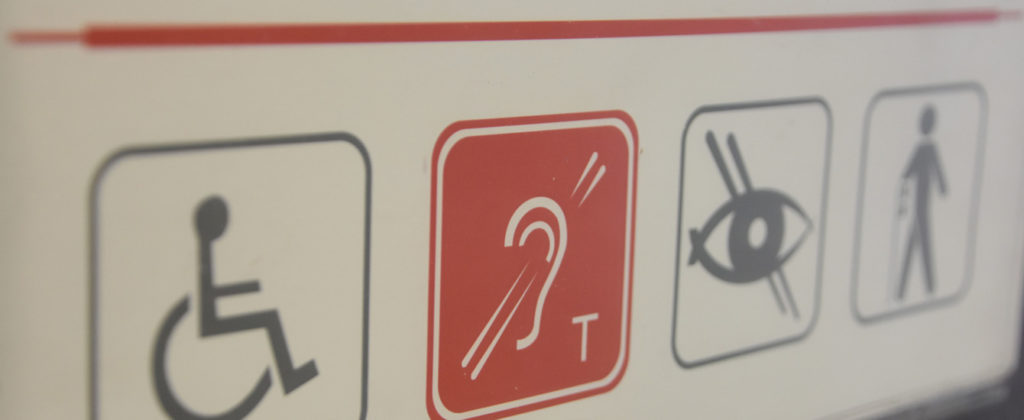Accommodations

Accommodations Available
In collaboration with the Clark University community, Student Accessibility Services ensures that students with disabilities receive reasonable accommodations and services to participate equally in the academic environment.
Eligibility for accommodations is based on an interactive process and case-by-case basis review of student self-report and supporting documentation that clearly demonstrate that a student has one or more functional limitations in the academic/residential setting and that these limitations require accommodation in order to achieve equal access. Accommodations are intended to provide equal access, not guarantee success or maximize a student’s potential. The law does not require institutions to waive specific courses or academic requirements considered essential to a particular program or degree. Instead, they are mandated to modify existing requirements to ensure that individuals are not discriminated against on the basis of their disability.
Students who have been approved for accommodations will use Accommodate to make and track supplemental accommodation requests, manage their accommodation letters and check the status of other service requests.
Disclosure of a disability is voluntary; however, it is important to note that the university is not responsible for providing accommodations to a student who has not provided appropriate documentation of a disability to Student Accessibility Services and requested a reasonable accommodation. Additionally, accommodations are not retroactive.

Below is a list of some common accommodations provided by Clark University. The University may deny an accommodation if it would fundamentally alter an essential requirement of a course or activity. The list is not exhaustive as every accommodation decision is an individual one made through the interactive process between SAS and the student.
Academic Accommodations
Testing Accommodations
If a student has a documented need for their tests to be reasonably modified so they can better access it, SAS will approve necessary accommodations. Whenever possible, testing accommodations should be administered through the specific academic department. When this is not possible, students can request to take their tests with SAS. Here are examples of some testing accommodations SAS can approve:
- Extended time on all timed in-class tests/exams
- Reduced distraction testing environment
- Proctored breaks
- Use of a computer for tests
If a student has the accommodation of computer access for exams/quizzes, computer access can be made available through the specific academic department or Student Accessibility Services. Students are not allowed to use their own laptops for tests without permission from their faculty member.
Notetaking Accommodations
Here are examples of some notetaking accommodations:
- Audio recording lectures
- Use of a computer for all in-class notetaking
Alternate Format Text Accommodations
If a student has a documented need for their texts and other classroom materials to be in alternate formats (such as PDF, mp3, Braille, etc.) SAS will help procure those materials in a format that is more accessible to the student. The student is still responsible of purchasing/renting their books themselves in whichever format they wish to do so in, but after they do so SAS will help students find their books in a different format.
Residential Life and Housing Accommodations
SAS works together with Residential Life and Housing (RLH) to approve and implement housing accommodations for students with disabilities who qualify. Housing accommodation requests need to be submitted in a timely manner for consideration. There is no guarantee that RLH will be able to deliver these accommodations. If a student requests an accommodation during the semester they should understand that the process could take some time as occupancy can dictate what options are available. Having an approved housing accommodation does not move a student to the top of a wait list.
For new incoming students, students should self-identify when filling out housing forms with RLH and make the same requests there that they are requesting through SAS.
Here are some examples of housing accommodations SAS can approve:
- Medical Single Occupancy
Medical singles are physically the same as traditional singles. Singles being used as medical singles are due to an accommodation approval and will be billed as comparable doubles instead of being billed as a single. - Accessible/Semi private bathroom
Clark does not offer 100% private bathrooms due to the layout of its residence halls. Some of its halls, like Dana, Hughes, and JSC, offer multiple lockable single stall bathrooms per floor and are considered semi-private. Those with this accommodation can be placed in a room in close proximity to at least one of these bathrooms. SAS and RLH will work hard to meet the needs to students with this accommodation as much as is reasonably possible. - Accessible room location
Some students need a room on the first floor, or a room in close proximity to an elevator. These are some examples of this accommodation in effect. SAS and RLH will work with students with a need for this type of accommodation and determine what options are available to meet their needs. - Emotional support animal
Animals are typically not allowed student housing, but if a student has a documented need for an emotional support animal (ESA) then RLH will allow a student to live with one if reasonable for the animal and the space it will occupy. - Air Conditioning unit
Clark typically does not allow air conditioning (AC) units be installed in the windows of rooms, but if a student has a documented need for one then Clark’s Physical Plant will provide the AC unit and install it, then, later on, will uninstall it when necessary. Students should not bring their own AC units to campus. - Assistive Technology
Assistive technology (AT) is a broad term to describe any piece of technology that can help mitigate a challenge due to a person’s disability. AT in this case refers to reasonable purchases such as bed shakers, flashing fire alarms, etc. Clark will cover reasonable purchases like this based on the student’s need.
Other Accommodations
Clark is committed to providing access throughout all parts of a student’s experience, even outside the classroom. Following this goal, here are some examples of accommodations that take place outside the classroom:
- Reduced course load
If a student needs to take less than four courses a semester, they may request this accommodation to take three instead. Some Clark activates or policies require a student to be taking four courses, but when approved for this accommodation that rule will be waived for that student. - Classroom relocation
Students with mobility impairments or chronic medical conditions who feel that a class location is not accessible may request classroom relocation. The director of disability services will work with the Registrar’s Office to process these requests.
Early registration
For classes Students with mobility impairments or chronic medical conditions who require to have their class schedule balanced in a particular way in order to better access their education can request this accommodation. Just like all accommodation decisions, these requests will be reviewed on a case-by-case basis.
Student Accessibility Services
2nd floor, Offices 208 and 210
Shaich Family Alumni and Student
Engagement Center
950 Main Street
Worcester, MA 01610
1-508-798-4368
+1-508-793-8877 Fax
Monday-Friday
9 a.m. to 5 p.m
Excluding holidays and campus closure days.
